Easy a Script You Have No Idea What Its Like the a is for Awesome

50 of the best screenplays to read and download in every genre.
Looking for the best screenplays to read? You're in the right place. We've been strong advocates for the benefits of reading screenplays for a long time as it's one of the simplest ways to learn how to write.
With that in mind, we've put together a mega list of the fifty best screenplays to read for aspiring screenwriters.
This list of the best screenplays to read is grouped into the five main genres you'll find in Hollywood today: drama, comedy, action/adventure, thriller and horror. (We prefer to call sci-fi, western, romance, etc. sub-genres of these five and you'll find examples of these in the lists below too.)
A quick note on spec scripts vs. shooting scripts.
Both "shooting" movie scripts and "spec" movie scripts are included in this list.
If you're an aspiring screenwriter trying to break into the industry with a spec, it's important to ignore all the little formatting quirks that often come with shooting movie scripts. Sluglines with periods instead of dashes, large chunks of descriptive text, excessive use of camera angles and so on, are all expressions of writers who've made it.
If you haven't yet, keep things simple by sticking to regular spec script formatting. So, without further ado, it's time to get to the first best screenplay in our list…
Click to tweet this post.
Best screenplays to read:drama.
1. Eternal Sunshine of the Spotless Mind.
screenplay by Charlie Kaufmann.
Boy meets girl. Boy loses girl. Boy erases memories of being with girl. This typically Kaufman-esque story could arguably be called best screenplay he's ever written. Watch out for the long chunks of description, though, as this style isn't recommended in spec movie scripts.
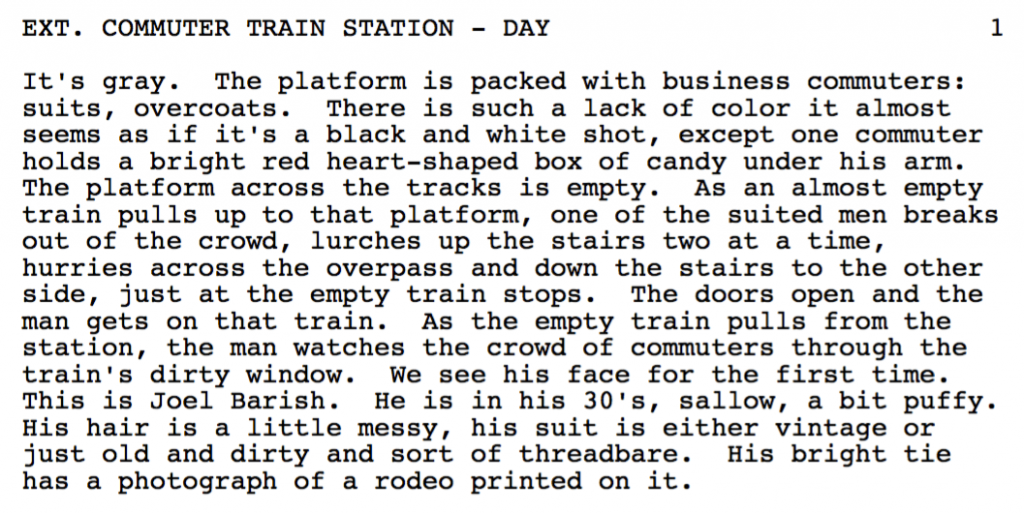

2. Good Will Hunting.
screenplay by Matt Damon and Ben Affleck.
This best screenplay winner began life as Damon's final assignment for his Harvard playwriting class. Then he turned to Affleck to help turn it into a script. They then set about developing the story into a thriller about a young man targeted by the FBI. It was Rob Reiner who persuaded them to turn it into a drama and focus on the relationship between Will and his psychologist.


3. Jerry Maguire.
screenplay by Cameron Crowe.
Easily the best of Crowe's screenplays to date and the one that broke him into the Hollywood A-list. Earned a Best Screenplay nomination and is a personal favorite of screenwriter Craig Mazin.


4. Little Children.
screenplay by Todd Field and Tom Perrotta.
Based on the novel by Tom Perrotta, this is a skillfully woven tale of suburban angst that retains a very novelistic feel. An excellent case study in how to make voiceover work for and not against your script.


5. Lost In Translation.
screenplay by Sofia Coppola.
Coppola spent six months writing a series of short stories and "impressions of Tokyo" that went on to become a seventy-page script. As understated as the movie itself, this screenplay is a real lesson in how to construct "small" scenes that move the story forward and keep the reader interested.
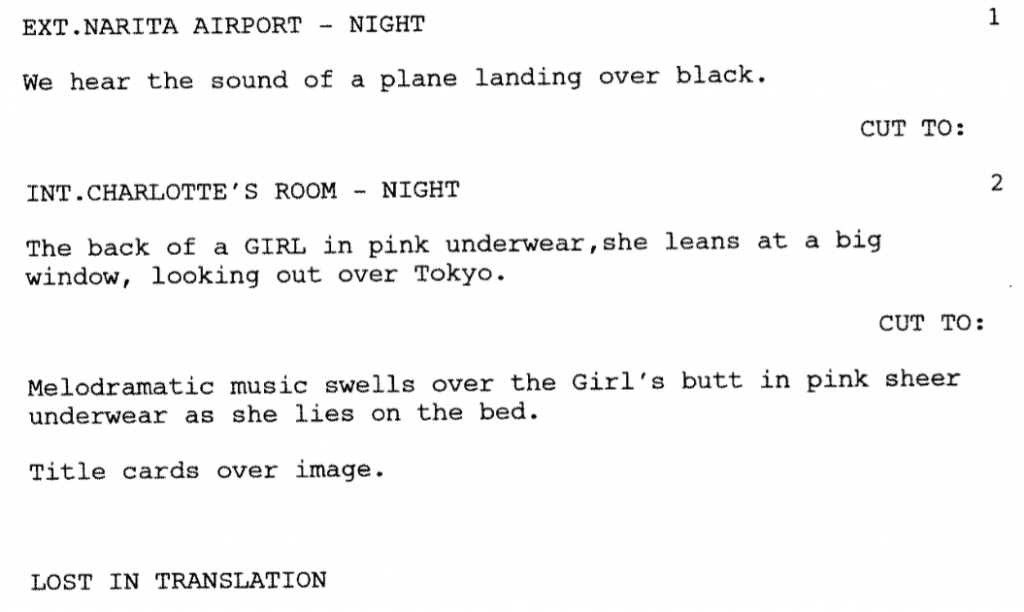

6. Straight Outta Compton.
screenplay by Johnathan Herman and Andrea Berloff.
Unsure of what direction the script should take, a first draft arose out of ten months of research, interviewing as many people associated with rap group NWA as possible. The result was this blistering account of the group's rise and fall and was only Berloff's second produced feature and Herman's first.
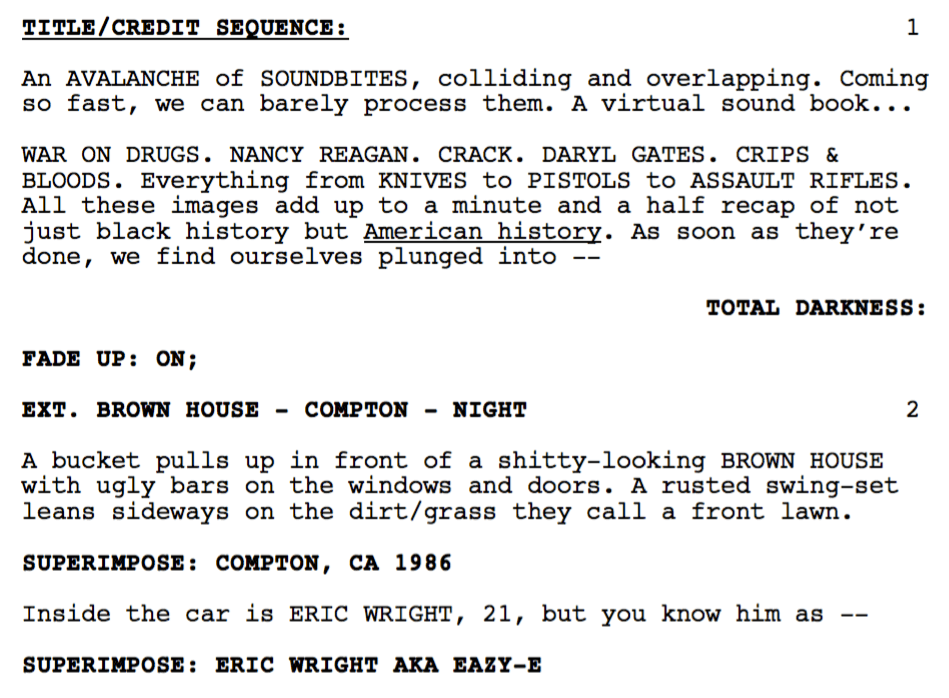

7. The Truman Show.
screenplay by Andrew M. Niccol.
Originally a dark sci-fi thriller set in New York City and titled "The Malcolm Show," Niccol's one-page treatment would go on to become one of the greatest high concepts in movie history and best screenplays of all time. Nominated for the best screenplay Oscar but lost out to the schmaltzy Shakespeare In Love.


8. Up In the Air.
screenplay by Jason Reitman.
Like The Truman Show, this is another screenplay that expertly weaves comedy into its overall drama. Adapted from the novel by Walter Kirn, by one of the best script writers in Hollywood—Jason Reitman—this is a modern classic and definitely one of the best screenplays to read for aspiring screenwriters, no matter what their genre preference.
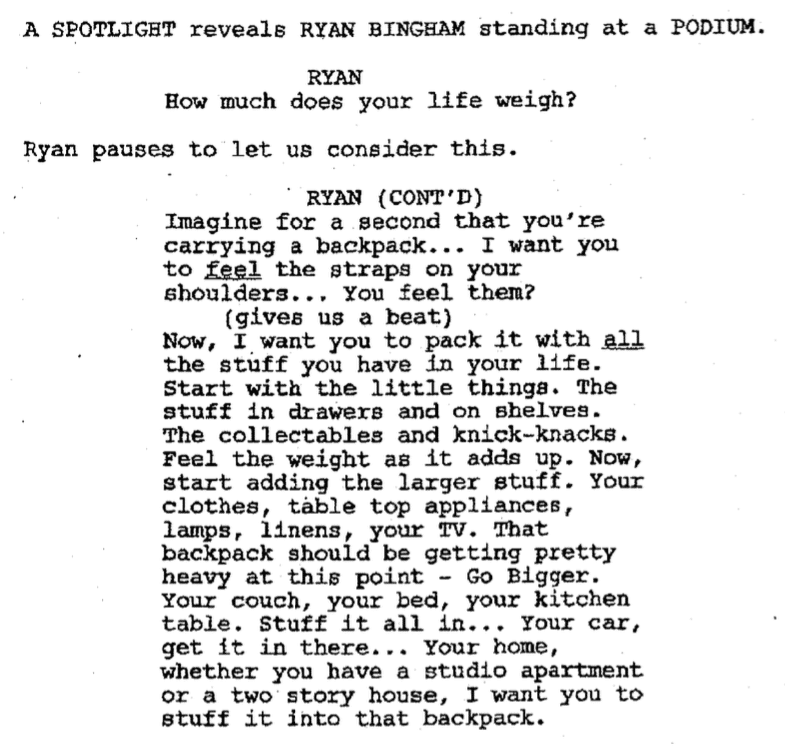

9. The Visitor.
screenplay by Tom McCarthy.
This is arguably a better script than the one McCarthy won the best screenplay Oscar for:Spotlight. Beautifully tight and sparse writing about a lonely professor learning to loosen up after discovering a couple of illegal immigrants living in his New York apartment.


10. Whiplash.
screenplay by Damien Chazelle.
Having already won acclaim as a short film of the same title, Chazelle decided to adapt it into a feature and the result is one of the best screenplays to read in recent years. You can really feel Andrew's torment and passion in these pages.



Best screenplays to read: Comedy.
1. (500) Days of Summer.
screenplay by Scott Neustadter and Michael H. Weber.
Neustadter and Weber began this screenplay by simply writing down on index cards all of the most painful relationship experiences they'd ever had. Many of them wound up in the final draft and it's this mixing of realism with its avant-garde structure that makes it a great script to read for the aspiring writer.


2. Bridesmaids.
screenplay by Annie Mumolo and Kristen Wiig.
This best screenplay choice broke new ground by having female characters indulge in moments of "poop humor" in a way not seen before on screen. But beyond the infamous wedding dress scene, there's a heart to this script and a vulnerable protagonist with whom we can all identify.


3. The Hangover.
screenplay by Jon Lucas and Scott Moore.
Written on spec by writing team Lucas and Moore (Four Christmases, Ghosts Of Girlfriends Past), this script is a near-perfect execution of a very high concept. Along with (500) Days of Summer, this is probably the best screenplay to come out in 2009.


4. Hannah and Her Sisters.
screenplay by Woody Allen.
Bookended by Thanksgiving dinner parties and with a novelistic feel, this best screenplay Oscar winner is a perfect blend of comedy with weighty themes about the meaning of life. While Allen himself may remain dissatisfied with the ending, this is one of his best screenplays to read if you're a comedy writer.
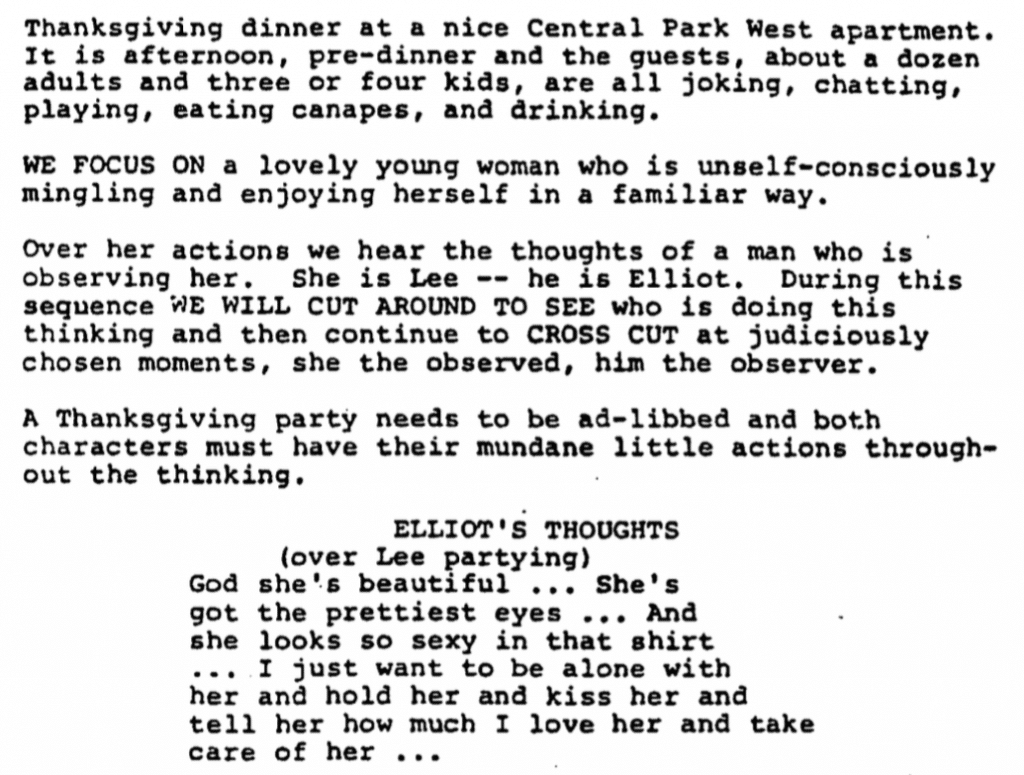

5. Mean Girls.
screenplay by Tina Fey.
Tina Fey turned her hand to feature writing with this adaptation from a book by Rosalind Wiseman. The writing is just as smart, funny and relevant as when the movie first came out over ten years ago.
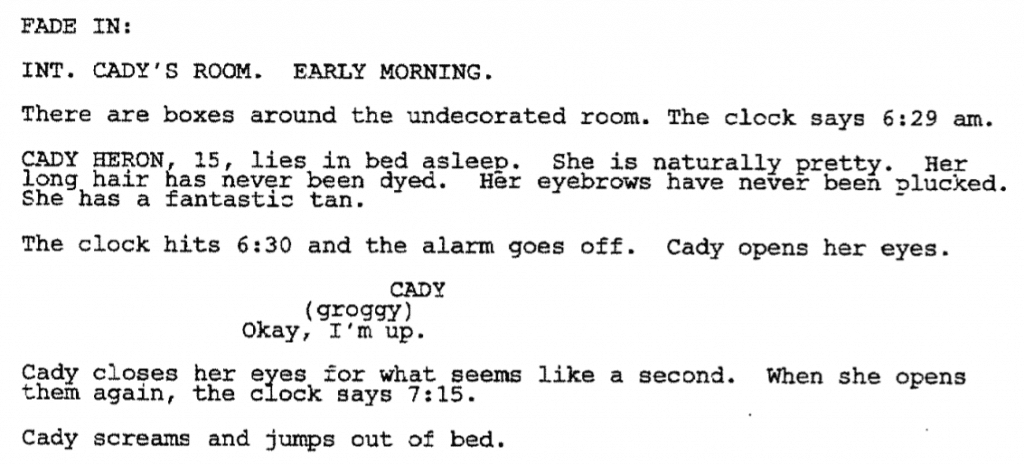

6. Planes, Trains & Automobiles.
screenplay by John Hughes.
Some may put a movie like Ferris Bueller's Day Off or The Breakfast Club as their choice for quintessential John Hughes comedy. For us, it's this Steve Martin/John Candy two-hander. Without a doubt, the best screenplay to read if you're writing a comedy road trip movie. Or any comedy for that matter.


7. Sideways.
screenplay by Alexander Payne and Jim Taylor.
Rex Pickett's novel begins with Miles at home and takes a while before he hits the road with Jack. Payne and Taylor, however, get the story moving right off the bat by opening with Miles getting ready for the trip. And the pace doesn't let up in this darkly funny story of middle-aged angst.


8. Stranger Than Fiction.
screenplay by Zach Helm.
Dismissed by some as Charlie Kaufman-lite, this is the best screenplay to read to get your creative juices flowing if you write dark comedy. Imaginative, thought-provoking, high concept and, best of all, extremely funny.
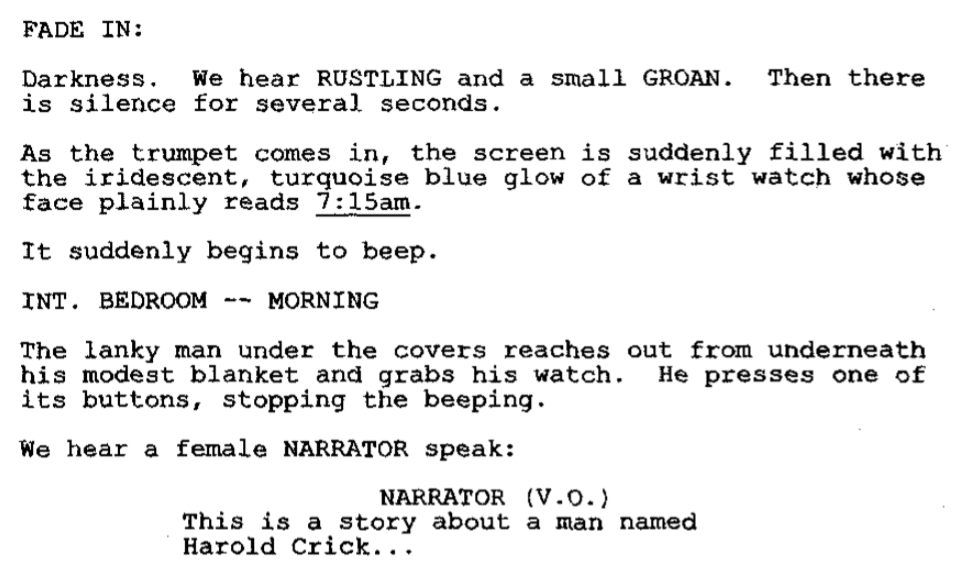

9. There's Something About Mary.
screenplay by Peter Farrelly, Bobby Farrelly, John J. Strauss, and Ed Decter.
One thing many aspiring comedy screenwriters fail to do is add set pieces to their spec screenplays. From Ted picking Mary up for prom, to getting arrested for cruising, this is the best screenplay to learn how to elevate a simple situation into a big comedic set piece.
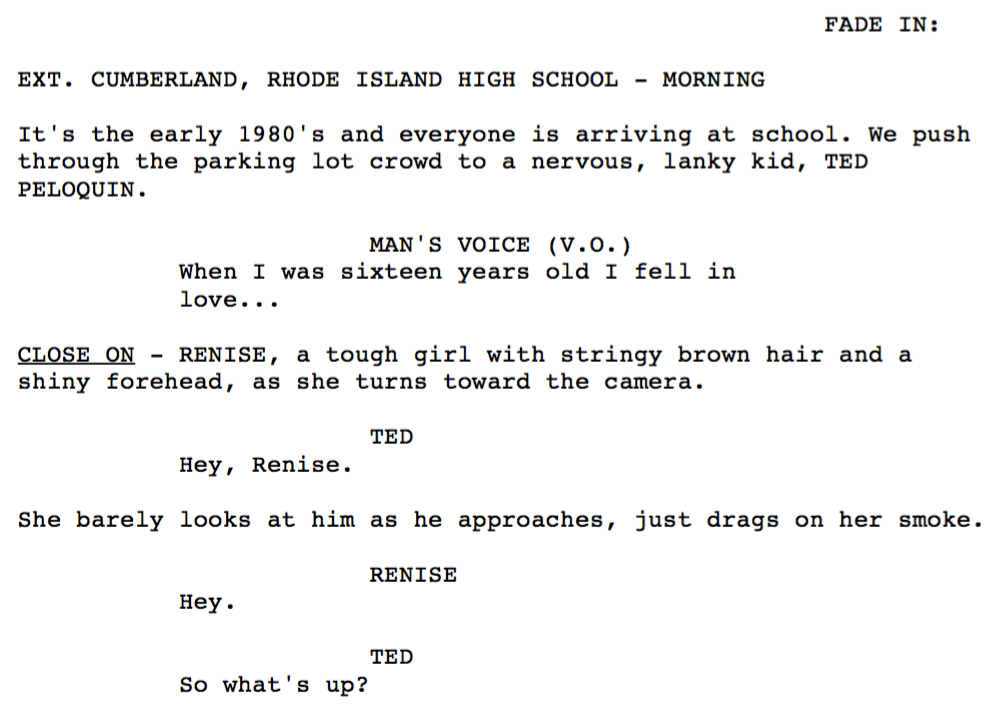

10. When Harry Met Sally.
screenplay by Nora Ephron.
Heavily influenced by Woody Allen, this screenplay grew out of a simple conversation between Ephron and the movie's director, Rob Reiner: can a man and woman ever remain just platonic friends? The result was this best screenplay Oscar nominee and a classic of the rom-com genre.


Best screenplays to read: action/adventure.
1. The Bourne Ultimatum.
screenplay by Tony Gilroy, Scott Z. Burns, and George Nolfi.
Reading this script feels like you're watching Peter Greengrass' choppy, frenetic direction. It's all right there on the page and studying this script will really show you how to give action scenes a sense of urgency.
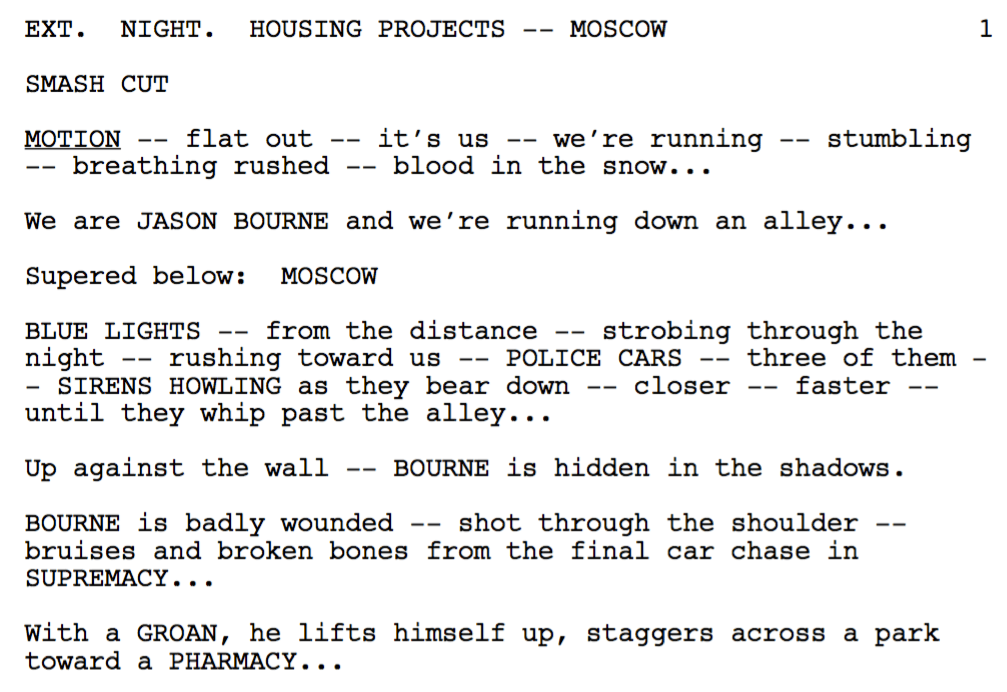

2. The Dark Knight.
screenplay by Jonathan Nolan and Christopher Nolan.
Christopher Nolan helped bring a much darker edge to the Batman franchise with Batman Begins, and this collaboration with his brother is an even better screenplay. Absorb all you can from this exceptional piece of work.
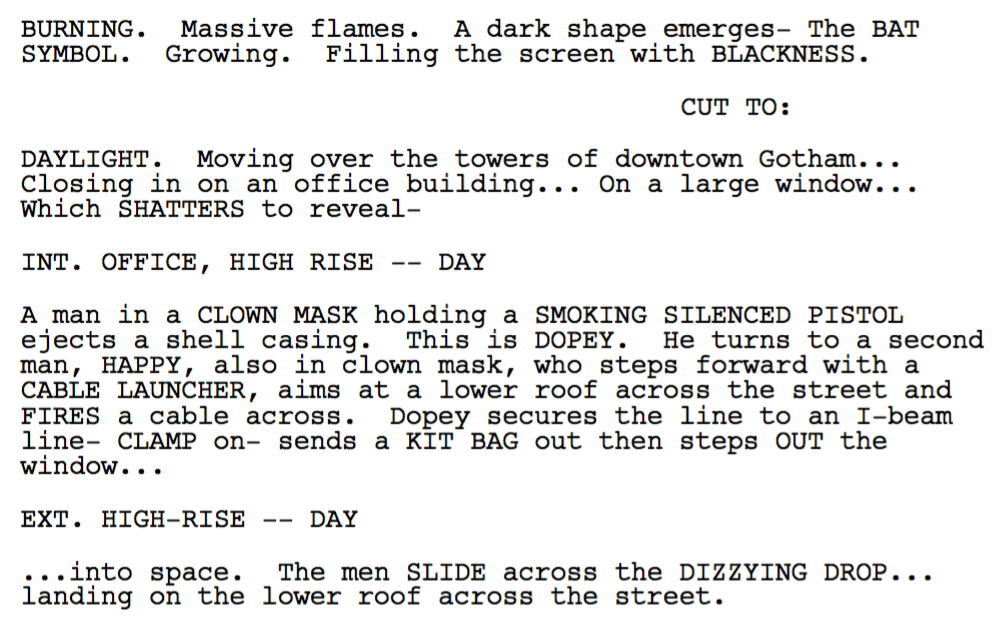

3. Die Hard.
screenplay by Jeb Stuart and Steven E. DeSouza.
De Souza reportedly wrote the script to this seminal action movie as if the antagonist, Gruber, were the protagonist. He said, "If he had not planned the robbery and put it together, Bruce Willis would have just gone to the party and reconciled or not with his wife. You should sometimes think about looking at your movie through the point of view of the villain who is really driving the narrative." Wise words indeed.
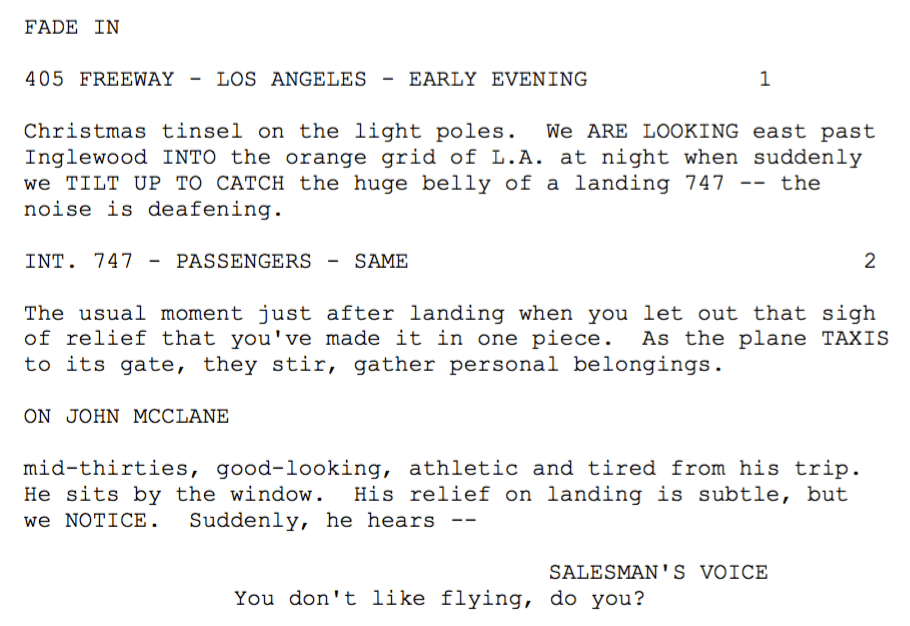

4. Ocean's Eleven.
screenplay by Ted Griffin.
Griffin took the story and script from the 1960 version and, with the help of Steven Soderbergh's direction, created one the coolest heist movies of all time. Definitely one of the best movie scripts to read and study if you're an action writer.


5. The Lord of the Rings: The Fellowship of the Ring.
screenplay by Fran Walsh, Philippa Boyens, and Peter Jackson.
Screenwriters Walsh, Boyens and Jackson approached writing the screenplay by making significant edits to the novel and zeroing in on much more on Frodo's story with the ring. Absolute required reading for any aspiring fantasy/adventure writers.
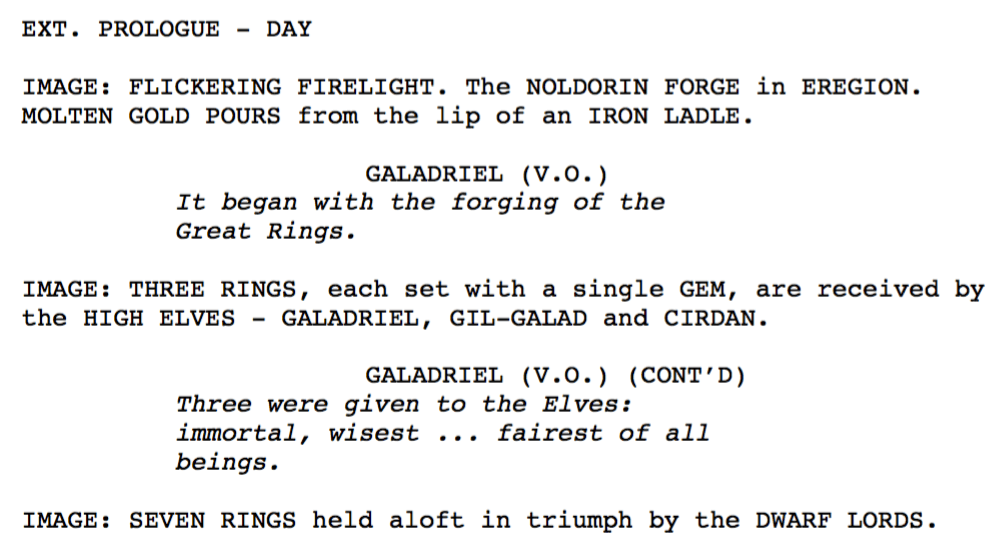

6. Inside Out.
screenplay by Pete Docter, Meg LeFauve, and Josh Cooley.
There are so many writing lessons to be learned from reading this best screenplay Oscar-nominated script. The way all the characters' emotions are chosen for optimal conflict. The way Riley isn't interested in stereotypically feminine pursuits but is a hockey enthusiast. The way the theme of emotions connecting people together is thread through her journey, etc. Yet another Pixar classic.


7. Lone Survivor.
screenplay by Peter Berg.
The big takeaway from reading this screenplay is the value of research. Berg met the families of the deceased and had the story's protagonist, Luttrell, move in with him while writing the script. Oh, and he also embedded with Navy Seals for a month in Iraq. Now that's dedication to the craft.
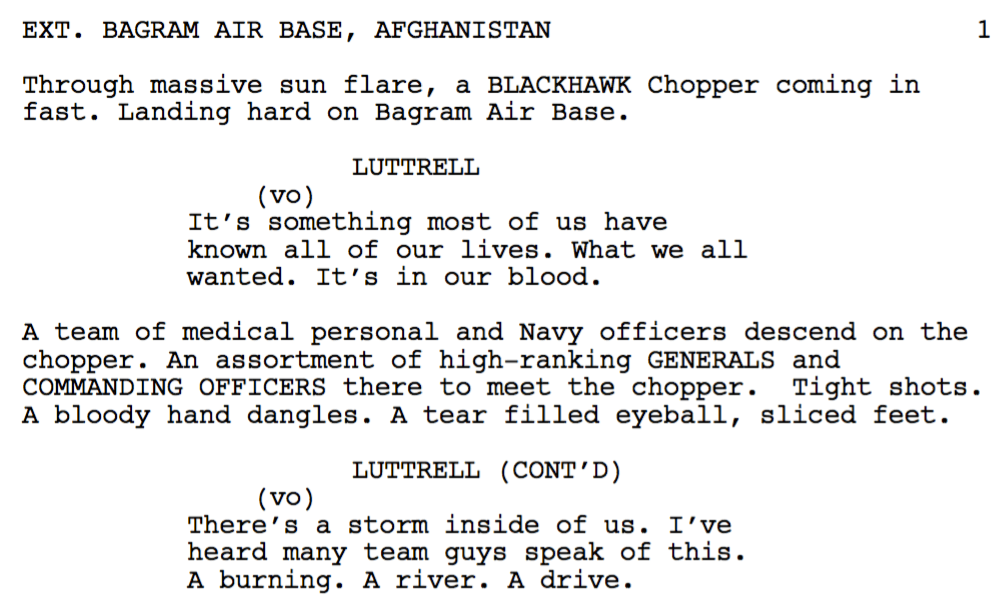

8. Looper.
screenplay by Rian Johnson.
Johnson has said of writing the script he wanted it to be character based rather than focus on the mechanics of time-travel. He drew inspiration from movies such as The Terminator, 12 Monkeys, and Witness. One of the best screenplays to read if you love mixing sci-fi with ironic humor and time-travel.


9. The Matrix.
screenplay by the Wachowskis.
The Wachowskis pitched the script to Warner Bros. who were initially skeptical of its philosophical musings and tricky SFX for the time. They then decided to bring on board underground comic book artists Steve Skroce and Geof Darrow to storyboard the entire film, shot-by-shot. Warners were impressed and the rest, as they say, is history.


10. Zombieland.
screenplay by Rhett Reese and Paul Wernick.
Having kicked the idea around for several years, Reese and Wernick originally wrote the story as a TV spec. It was director Ruben Fleischer who helped develop it into a feature by adding in a specific destination to the characters' road trip in the form of the amusement park.


Best screenplays to read: thriller.
1. Collateral.
screenplay by Stuart Beattie, Frank Darabont and Michael Mann.
Three of the best script writers in Hollywood collaborated for this modern classic. Beattie originally had the idea for the movie aged seventeen while riding in the back of a cab in his native Sydney. He then worked up a two-page treatment called The Last Domino, which he turned into a screenplay. Later he was lucky enough to be put in touch with Darabont and then Mann who both contributed revisions.
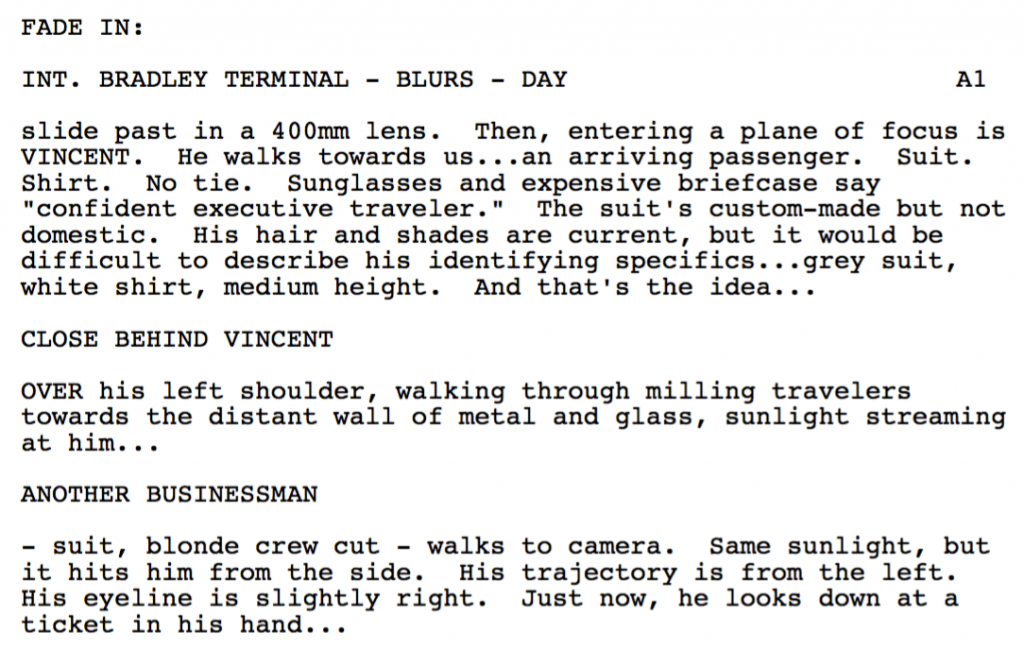

2. The Departed.
screenplay by William Monahan.
Monahan's reworking of the original Asian gangster movie Infernal Affairs as a fight between Boston's police department and the Irish American crime scene is very impressive. In fact, it earned him a Best Screenplay (Adapted) award from not only the WGA but also the Academy Awards.
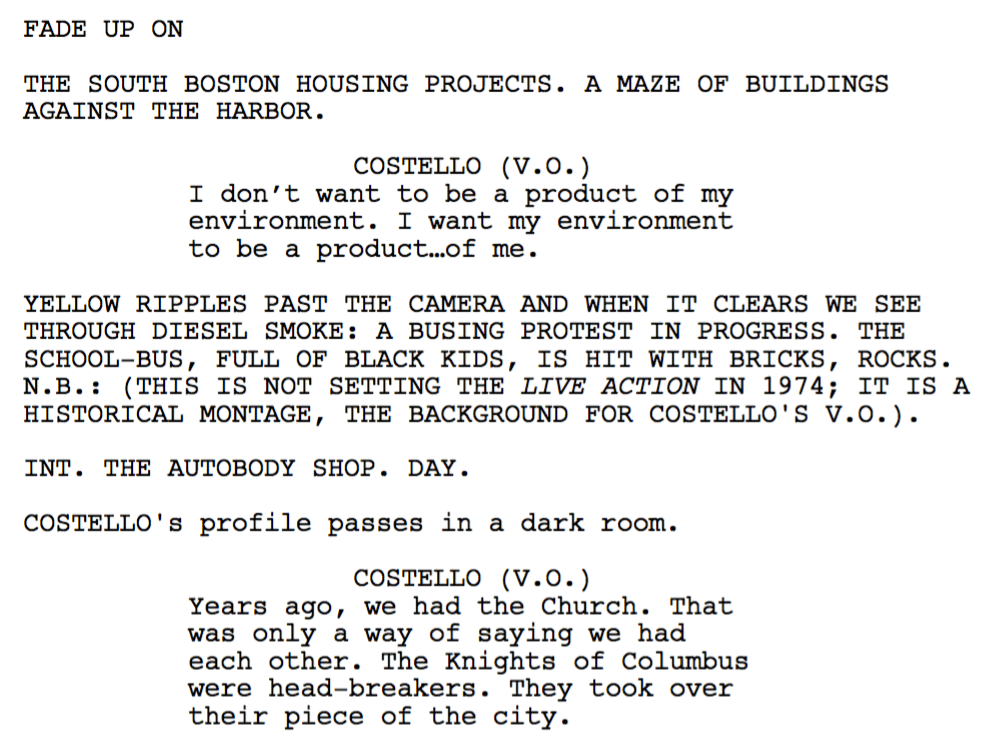

3. Get Out.
screenplay by Jordan Peele.
The first draft of this much-lauded horror/comedy satire was written Peele in two months. He then went on to write a staggering 200 more drafts before finalizing the one that went on to win the Best Original Screenplay Oscar in 2017.


4. The Girl on the Train.
screenplay by Erin Cressida Wilson.
Yet another best screenplay nominee based on a novel. Much like the adaptation of Nick Hornby's High Fidelity, this screenplay also moves the action from the UK to the US. Wilson also expertly plays with the reader's perceptions of the protagonist, Rachel, and is one of the best screenplays to read in recent times.
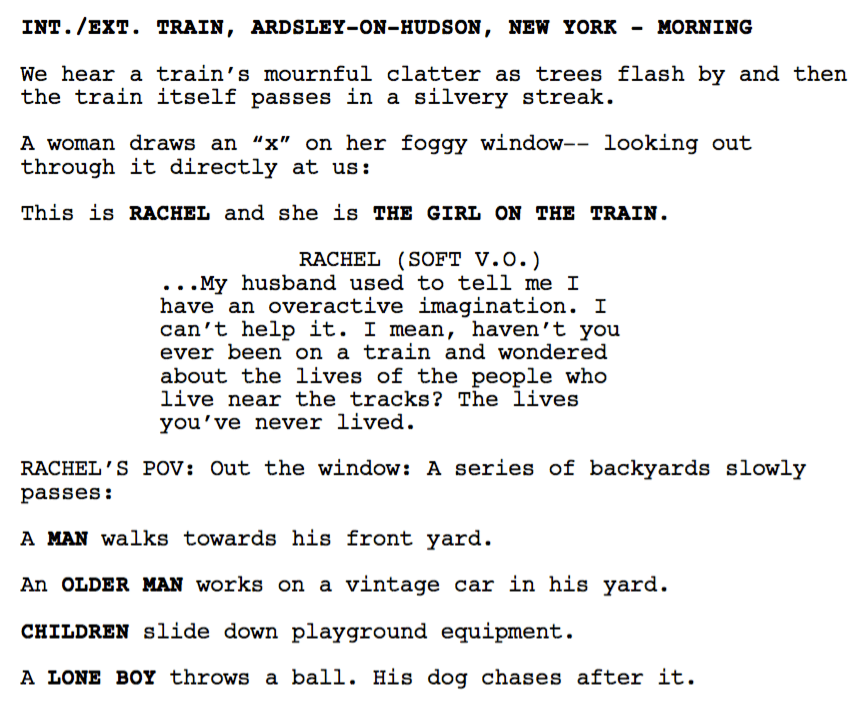

5. Nightcrawler.
screenplay by Dan Gilroy.
Gilroy had the initial idea for Nightcrawler way back in 1988. He spent years developing the screenplay, making Lou a traditional "good guy" protagonist and the story a murder mystery. In order to break with the stereotype, though, he finally hit upon the idea of creating an "anti-hero success story" and the result is this exceptional (slugline free) screenplay.
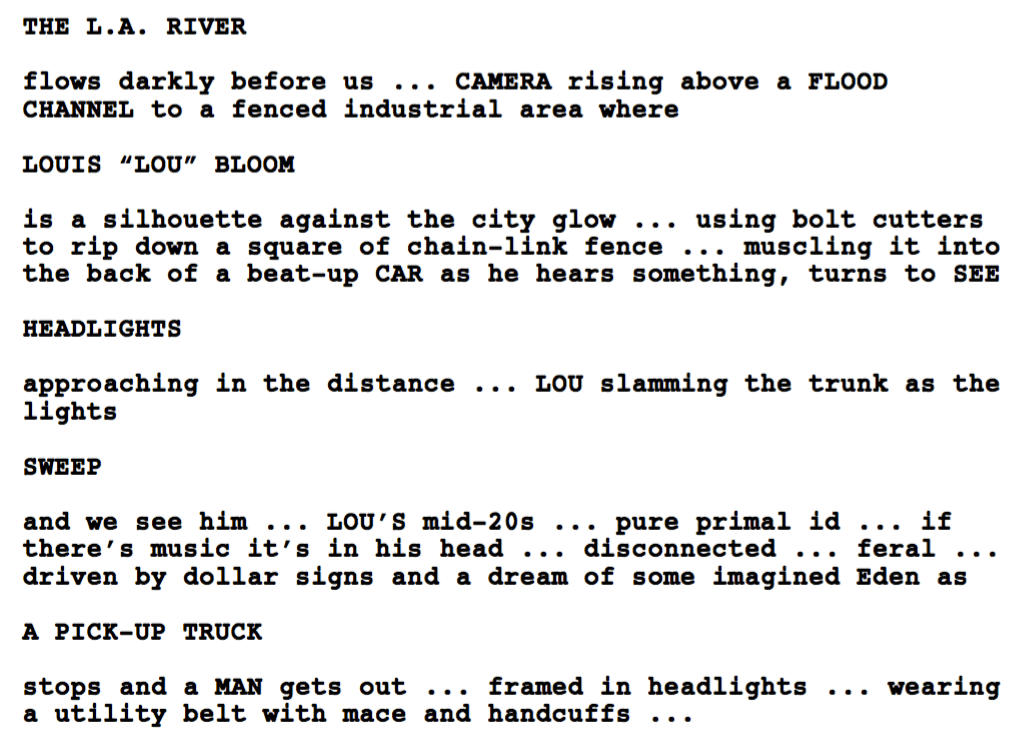

6. No Country for Old Men.
screenplay by Joel Coen and Ethan Coen.
This Coen brothers' adaptation from the novel of the same name by Cormac McCarthy is notable for its refusal to rely on dialogue to move the story forward. Reading the script you can see why Josh Brolin was initially nervous. "I mean it was a fear, for sure, because dialogue, that's what you kind of rest upon as an actor, you know?" Won the best screenplay (adapted) category at the 80th Academy Awards.
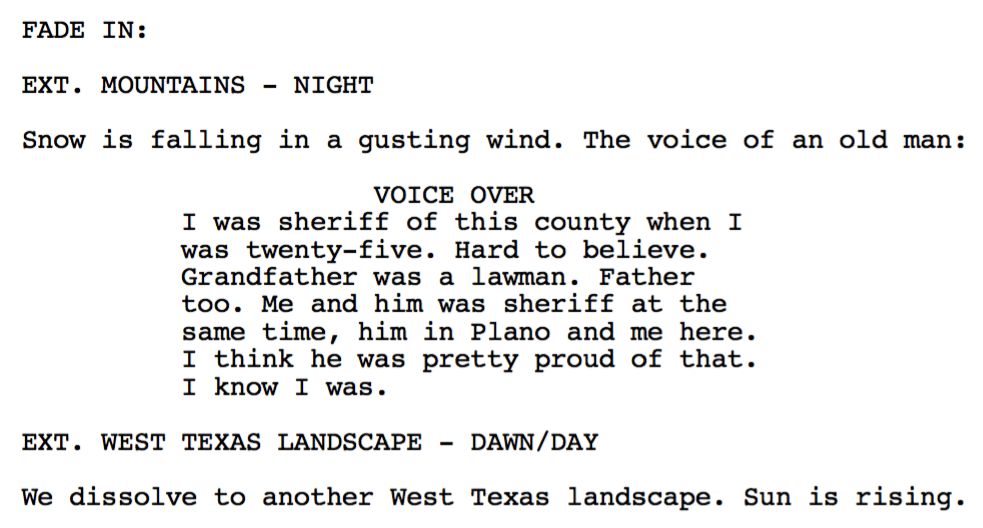

7. Prisoners.
screenplay by Aaron Guzikowski.
Guzikowski based the script on his own short story, which in turn was inspired by The Tell-Tale Heart in which a father gets revenge on the man who kills his kid in a hit and run by sticking him down a well. The best screenplay we've read from an upcoming thriller writer in a while.


8. Reservoir Dogs.
screenplay by Quentin Tarantino.
Many of the tropes have been copied almost to the point of cliche by a generation of later writers. But this script was groundbreaking for its time and is impossible to ignore if you want to learn how to become a screenwriter.


9. Training Day.
screenplay by David Ayer.
When asked about whether he was surprised about the success of Training Day, Ayer replied "No. That was a shocker. I wrote that script on spec out of frustration. I was trying to make sales writing mediocre movie scripts, I guess, trying to anticipate what the studios would buy, and I wrote that for myself. I was tired of second-guessing the system and I just wanted to say something." Great advice for any aspiring screenwriter.
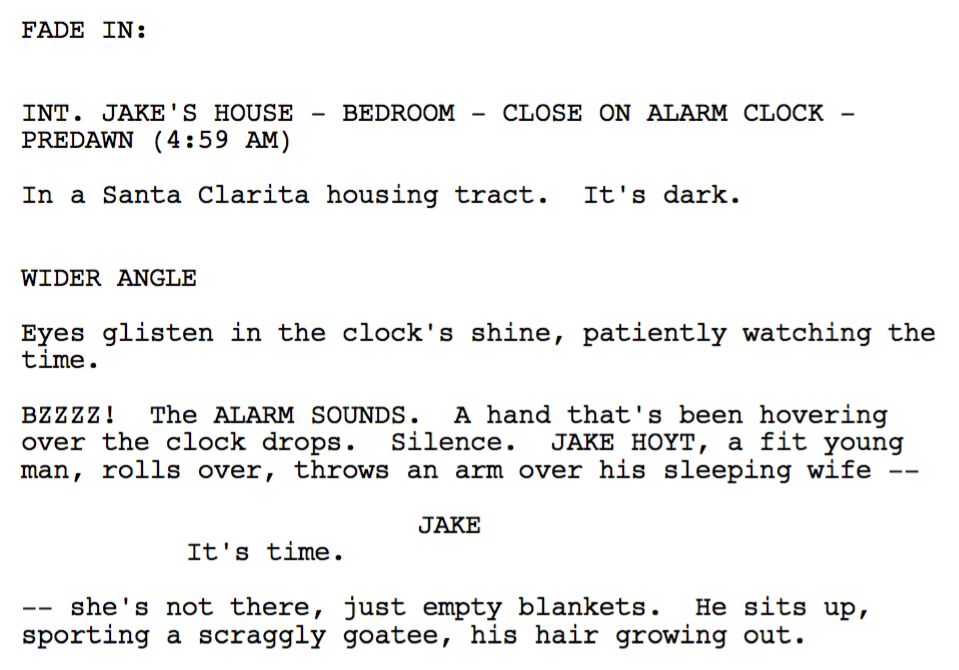

10. The Usual Suspects.
screenplay by Christopher McQuarrie.
McQuarrie and director Bryan Singer both worked on the initial concept of five guys meeting in a police line-up. It came from an idea that occurred to Singer from Captain Renault's line in Casablanca: "Round up the usual suspects." McQuarrie then worked up this masterfully complex story from one of his own previously unproduced movie scripts.
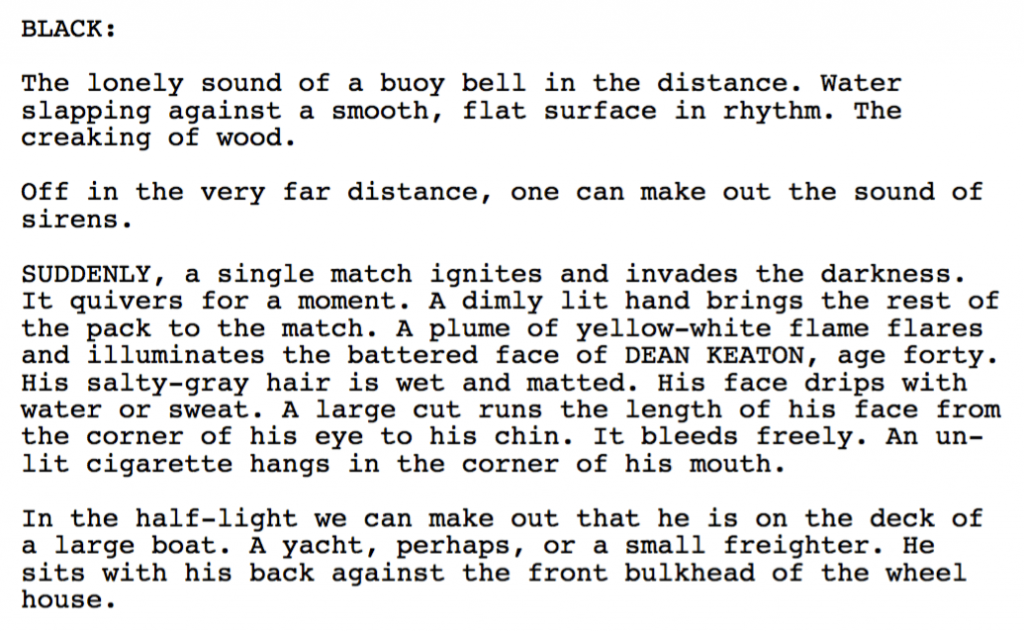

Best screenplays to read: horror.
1. Alien.
screenplay by Walter Hill, Dan O'Bannon, and David Giler.
Famed for its minimal, vertical writing style, O'Bannan would say of his original draft, "I didn't steal Alien from anybody. I stole it from everybody." Classic 1950s sci-fi films such as Forbidden Planet, Thing From Another World and Planet Of The Vampires. They're all in here and it's definitely one of the best screenplays of all time.


2. The Babadook.
screenplay by Jennifer Kent.
The Babadook is another script based on a short film—Kent's 2005 movie, Monster. Perhaps that's why, in contrast to Jordan Peele's 200 drafts of Get Out, Kent had nailed the script in just five drafts. A fantastic exploration of the darkness within ourselves, and one of the best horror movie scripts for any aspiring writer to read.


3. Dawn Of The Dead (Remake).
screenplay by James Gunn and Michael Tolkin.
The screenplay only credits Gunn and Tolkin as rewriters of this George A. Romero script. In fact, Scott Frank (Out Of Sight, Minority Report) was also brought in to add some oomph to the action sequences. A worthy remake of the 1978 original and one of Stephen King's favorite movies.
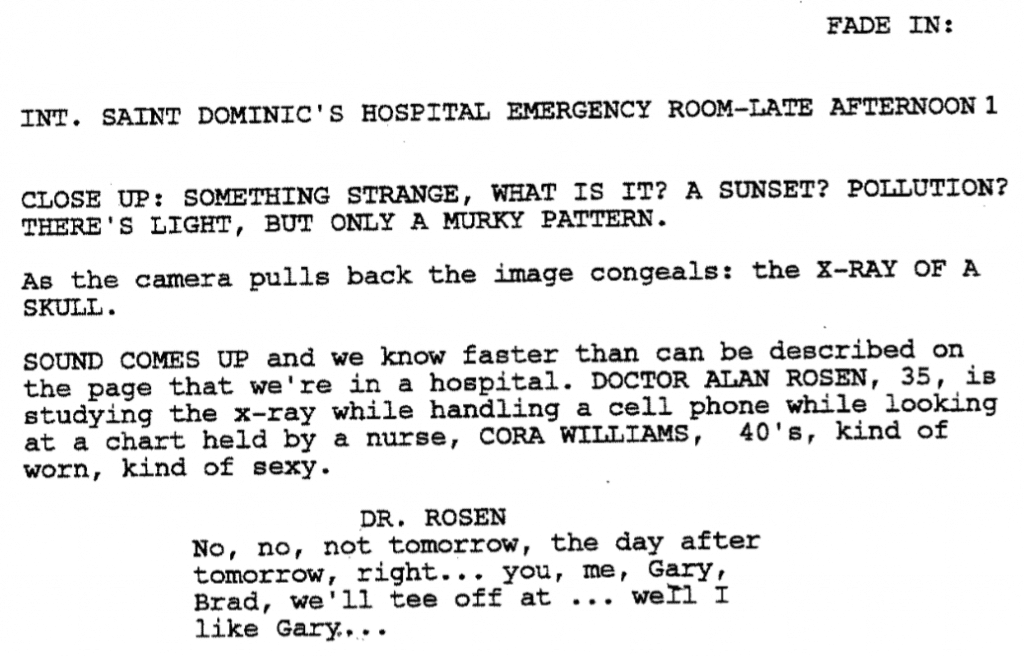

4. Final Destination.
screenplay by James Wong, Glen Morgan, and Jeffrey Roddick.
The origins of this spec screenplay are just as creepy as the film. As Reddick recounts, he was given the idea by a real-life story of a woman whose life was saved by her mom who warned her not to take a flight that wound up crashing. Reddick then wrote the script as an X-Files spec but was advised by a friend to reshape it into a feature.


5. Hereditary.
screenplay by Ari Aster.
Aster originally conceived of the script as a drama about a family tragedy drama, inspired by the grisly real-life incident from 2005 in which John Hutcherson accidentally decapitated his childhood friend, Frankie Brohm. However, as the script developed, the second half gradually morphed into the full-blown horror we have now—although Aster is still careful not to call it a horror film outright.
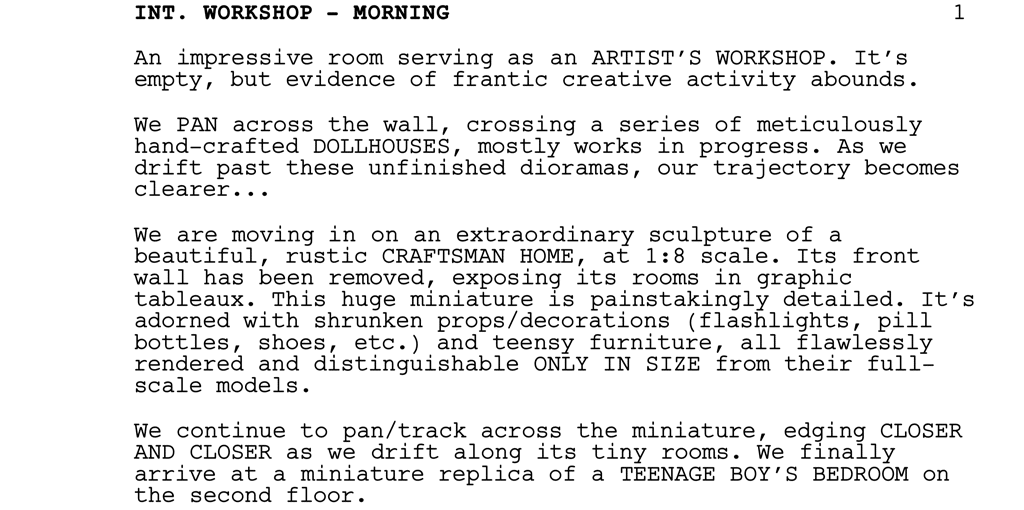

6. Insidious.
screenplay by Leigh Whannell.
The same core team behind the Saw movies—writer, Leigh Whannell, and director, James Wan—had a point to prove with this script. Read this first and best of the Insidious franchise for a masterclass in how create a horror through tension over gore.


7. Jennifer's Body.
screenplay by Diablo Cody.
Fresh off her success with Juno, Cody originally intended to write a straight, slasher horror movie. But she notes, "the humor just kept sneaking in." If you're writing a horror movie with heavy doses of comedy involved, this is one of the best scripts to read.


8. The Omen.
screenplay by David Seltzer.
Seltzer was commissioned by the producer, Harvey Bernhard, to write a movie about the Antichrist after Bernhard was given the idea by a friend, Bob Munger. It took Seltzer exactly one year to write the screenplay and it would go on to be one of the most iconic horror movies of all time.


9. Saw.
screenplay by Leigh Whannell and James Wan.
This script was born purely out of budgetary restrictions as writers Whannell and Wan deliberately wanted to write a horror film as cheaply as possible. One that they could finance themselves. Inspired by low-budget movies such as Pi and The Blair Witch Project, they decided on the concept of two actors, one room, and one dead body. Easily one of the best screenplays to read for horror writers.


10. The Sixth Sense.
screenplay by M. Night Shyamalan.
Already a working screenwriter, Shyamalan's big breakthrough came with this best screenplay nominee that pulls the wool over the reader's eyes until the very end. This is still one of the finest horror movie scripts ever written.
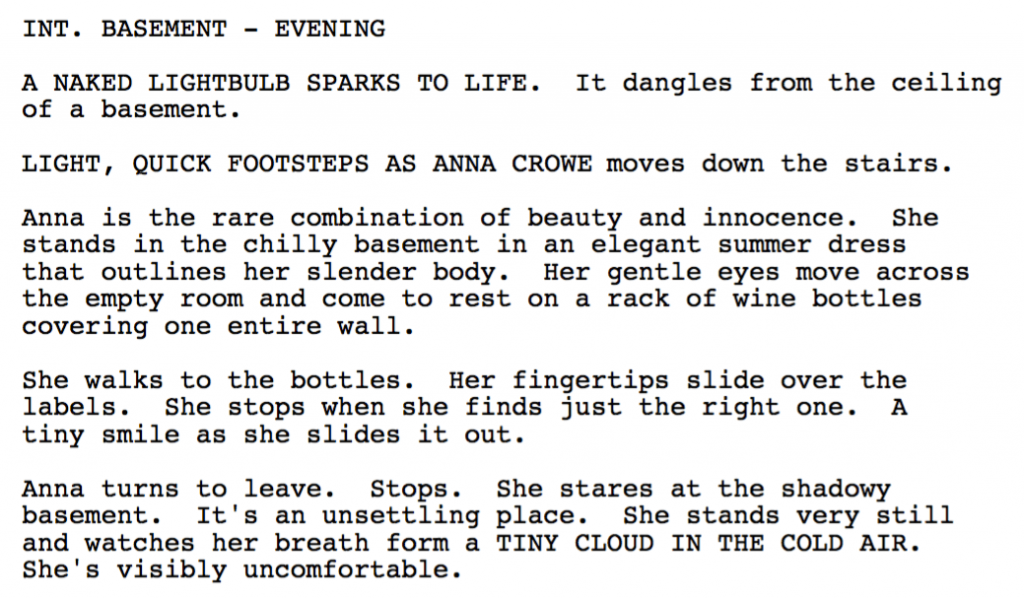

Click to tweet this post.
###
BONUS SCREENPLAYS TO READ: You can download five more of the best screenplays to read in each genre in this post. Read as many movie scripts as you can and watch your screenwriting ability soar.
The best screenplay writers put everything right there on the page to make you connect with the story. Now it's up to you to extract it and put it into your own movie scripts.
Best scripts to read frequently asked questions.
Q1. What should screenwriters read?
A. As many scripts as possible! You should also not confine yourself to just reading screenplays written by professional screenwriters, like those presented here. Read as many spec scripts as you can as well—the good, and especially the bad ones. You'll learn just as much from these as from shooting scripts by seeing what not to do.
Q2. Are screenplays useful to read?
A. In a word, yes. As we've said many times on this site, reading screenplays is an excellent way to learn how to write. (And it's free.) You'll learn about structure, how to write scene, dialogue, pacing and so much more.
Q3. Which movie has the best screenplay?
A. It's purely subjective, of course, but many old-school screenwriting books and pros will say that best screenplays were written for the older classics. Scripts to movies like Casablanca, Some Like It Hot, Chinatown, etc. usually get a mention. While these are undoubtedly great scripts, are they the best scripts to read for the modern writer? Perhaps it's better to focus on reading modern scripts as these are what are actually getting produced right now.
Which screenplays did we miss?
What are your favorite movie scripts? Which movie scripts do you consider required reading? Are they on our list? If not, please comment below and let us know what screenplays you think we've missed out.
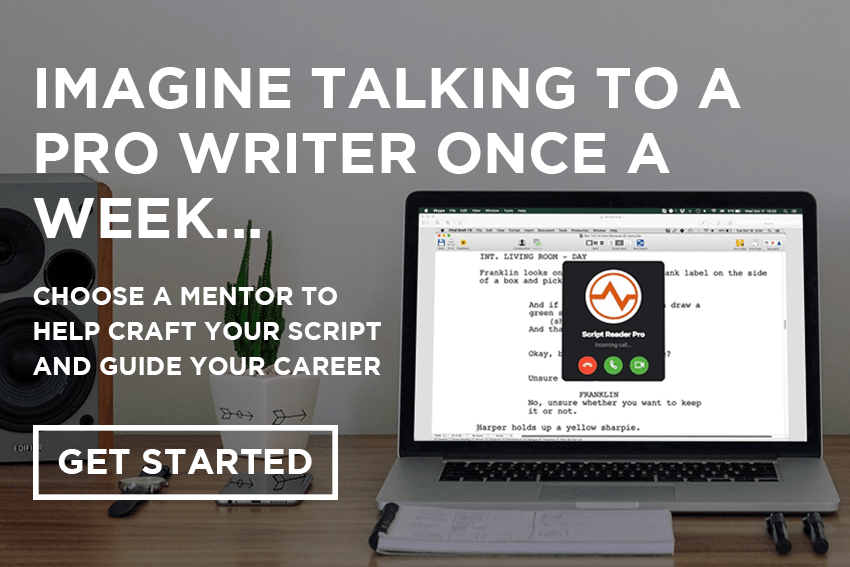
Enjoyed this? Here are more of the best screenplays to read…
50 of the Best TV Scripts to Download and Study to Improve Your Writing
20 Best Comedy Scripts to Read and Download For Free
15 Screenplay Examples From Each Genre for You to Download and Study
[© Photo credits: Unsplash, Flickr]
Source: https://www.scriptreaderpro.com/best-screenplays-to-read/


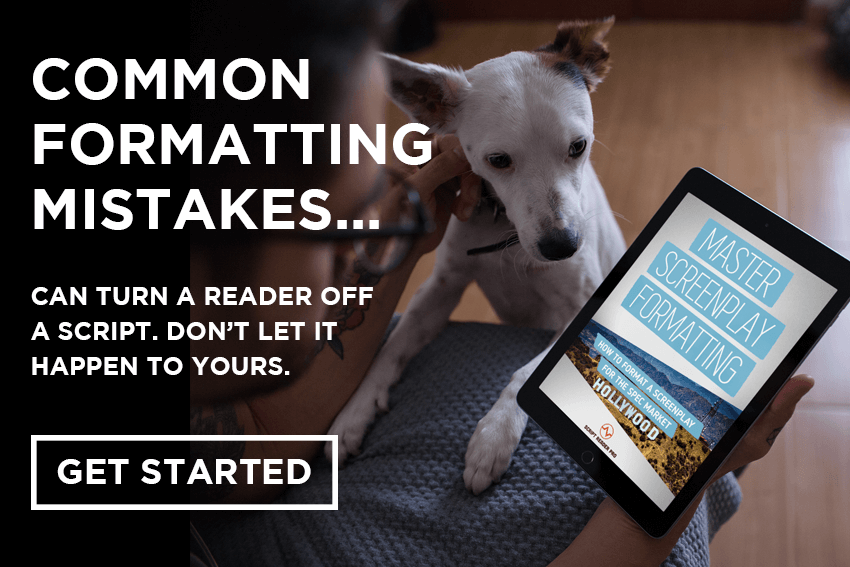
0 Response to "Easy a Script You Have No Idea What Its Like the a is for Awesome"
Post a Comment